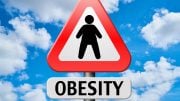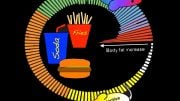
The human body prioritizes protein intake over other dietary components, leading to increased food consumption when protein is diluted in the diet. A paper from the Royal Society highlights this “protein leverage” as a significant factor in the rise of obesity, especially with the proliferation of fat and carbohydrate-rich processed foods.
Growing Evidence Supporting the Protein Leverage Hypothesis
The “protein leverage” hypothesis suggests that humans consume more food when dietary protein is diluted, especially with modern processed diets. This behavior is increasingly seen as a major contributor to the obesity epidemic. Integrated research is vital for effective interventions.
Humans, like many other species, regulate protein intake more strongly than any other dietary component and so if protein is diluted there is a compensatory increase in food intake. The hypothesis proposes that the dilution of protein in modern-day diets by fat and carbohydrate-rich processed foods is driving increased energy intake as the body seeks to satisfy its natural protein drive — eating unnecessary calories until it does so.
Supporting Research From the Royal Society
This paper, resulting from the Royal Society Discussion Meeting held in London last October, shows that observational, experimental, and mechanistic research increasingly supports protein leverage as a significant mechanism driving obesity.
The authors outline published studies that span mechanisms of protein appetite to show how the protein leverage effect interacts with industrially processed food environments and with changes in protein requirements across the life course to increase the risk of obesity.
For example, changing requirements for protein at certain life stages (such as the transition to menopause), as well as a combined impact with changes in activity levels or energy expenditure (e.g., retiring athletes or young people moving towards more sedentary lifestyles). Because data indicate that children and adolescents also show protein leverage, the authors discuss the potential impact of exposure to a high-protein diet in preconception or early life (for example through some infant formula feeds) in potentially setting up increased protein requirements and greater susceptibility to lower protein, processed diets in later years.
Addressing the Obesity Epidemic
With the World Health Organization (WHO) declaring obesity as the largest health threat facing humanity, the authors argue that there needs to be a focus on integrative approaches that examine how various contributors interact in obesity, rather than looking at them as competing explanations. This will also help researchers and policymakers understand how to move the field forward and which causes might be most relevant to tackling the rising obesity epidemic.
The authors conclude: “…it is only through situating specific nutrients and biological factors within their broader context that we can hope to identify sustainable intervention points for slowing and reversing the incidence of obesity and associated complications.”
Reference: “Protein appetite as an integrator in the obesity system: the protein leverage hypothesis” by David Raubenheimer and Stephen J. Simpson, 4 September 2023, Philosophical Transactions of the Royal Society B Biological Sciences.
DOI: 10.1098/rstb.2022.0212.R2









The research has been done, the problem is getting more highly educated healthcare professionals to accept the now senior lay American results of a problem which originated insidiously, silently and uniquely in the US. In 1980 the US FDA approved the expanded use of added ‘cultured-free’ (can cross the blood-brain barrier) monosodium glutamate (MSG) and by 1990 the US obesity/diabetes epidemic presented (CDC/NCHS data). Mysteriously, seriously ill in early 1981 at age thirty-seven with a thorough medical exam indicating-for only asymptomatic gout and a sluggish metabolism, I was left to my own devices to find a cause and a cure.
In late 1981 I first learned I had/have multiple very, very mild food allergy reactions through shortly thereafter medically abandoned “cytotoxic blood testing for food allergies.” I didn’t learn of the true toxicity of added MSG until the summer of 2000, from another adult male victim of the early 1980s. Simply put, chronic long-term (months to decades; highly individual, many individual variables) nearly subclinical non-Ige-mediated food allergy reactions (e.g., Dr. Arthur F. Coca, by 1935; The Pulse Test, 1956) aggravated (or not) with officially (FDA in the US) approved food poisoning and/or related/resultant medical errors is the primary cause of the now global obesity pandemic. The US CDC, FDA and the WHO are not the global authorities on health matters they pretend to be.
Completely agree. I took me years of research (after decades of illness and stomach medications) to work out that food manufacturers were hiding hydrolyzed protein and MSG under so-called ‘innocuous names’ such as ‘natural flavours/flavouring, yeast extract, flavours, spices, spice extracts etc. It seems that if only a certain percentage of MSG/hdrolyzed protein remains in the product after manufacturing, food manufacturers can, using a legal loophole, use different names thereby disguising the known ‘nasty’ MSG. I thought that just not eating anything that contained MSG on the label would do it for me, I wish I could sue someone for the amount of years of ill-health, stress, not needed medications that had side effects. I’m so mad about it, I now talk about the food industry scam on Quora. Charles, if you ever feel like telling your story, I’d love to feature it on my blog. I doubt I can put links on this comment so, I leave it to you to reply (or not).
Sadly, Avalina, yours is about the best reply I’ve ever received, in years of commenting. More of my story is on the “About” page of my Odysee dot com video channel: https://odysee.com/@charlesgshaver:d?view=about
I’ll check back for a link to your blog if you want to try posting it. It’s now a mostly failed seventeen years and counting mission for senior lay me to ‘get-the-word-out.’
Interesting hypothesis, but protein RDAs are set way too high for what most humans actually need. Obesity is driven by a diet devoid of nutrition, more so micronutrients than macros.